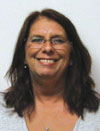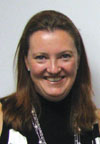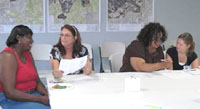|
|
|

|
Community-based
partnerships
Research leaves the laboratory
|
by Dawn Brazell
Public Relations
Getting some Hollywood residents to understand the value of getting
regular dental check-ups is like pulling teeth.
Literally.
Finding out why some Hollywood residents would rather forego dental
care and risk later emergency dental extraction is one of the passions
that drives Beth Carpenter, mayor’s assistant for Hollywood, to work
with researchers at MUSC.
 Beth Carpenter Beth Carpenter
Carpenter said she’s excited to partner with MUSC’s Community Engaged
Scholars Program in hopes of improving dental health care in her area.
It’s one reason she volunteered to be in the community-based
participatory research (CBPR) program, even though it means hours of
unpaid time on her part and that she has to learn new research skills,
she said.
“This is all new to me. I keep coming to the classes and doing what I
need to be doing. It’s been a learning experience the whole way, but I
love the way we’re reaching out to the community and getting their
input, which is important. Sometimes Hollywood gets forgotten out
there.”
 Dr. Renata Leite Dr. Renata Leite
Renata S. Leite, DDS, and assistant professor in MUSC’s Division of
Periodontics, said she loves it too. She discovered she wanted to get
out of the laboratory and into the community, where she feels a more
meaningful connection to what she’s studying. The team has the support
of Hollywood Mayor Jacquelyn S. Heyward, who has allowed Carpenter to
make it a priority as part of her job. Carpenter has made it much
easier to quickly establish a rapport with the community, which
includes a thriving Gullah population.
The project, overseen by MUSC’s Center for Community Health
Partnerships, began in August 2009. Leite’s study is one of six pilot
projects. The program provides training, pilot funds and mentorship for
teams consisting of an academic and community partner who are willing
to do CBPR.
Leite said she has realized how effective CBPR can be. “It’s different
from conventional research. You’re still collecting research, but it
also feels like you’re doing some kind of community service. “
It also opens doors of trust, she said. “When they realize that we’re
there to listen to their opinion, it makes them more open to whatever
we’re going to do later.”
The getting-acquainted period can take some adjustment, said Leite, who
recalls being a bit nervous the first time she attended a SUN or
Spiritual United Neighbors community meeting where she was out of her
element. “I was white, female, with a foreign accent and an
academician. I had all the possible barriers I could have. But I had
the mayor and Beth there backing me up.”
In the town of Hollywood, located 20 miles south of Charleston and
where people call each other by name when passing on the street, that
was all Leite needed to be accepted.
Carpenter said it’s critical getting the spiritual leaders in the
community on board. Town residents appreciate being asked what barriers
they face in getting dental and health care. “There are some
warm-hearted people in Hollywood. Once you reach them, they’ll do
whatever you need them to do.”
Leite said that has been the case with Carpenter, who has coordinated
their community meetings and been a passionate advocate for this type
of research in Hollywood. They’ve learned that many residents have had
bad dental experiences in the past and some have no mode of
transportation to get to a dental clinic. Leite said the goal is to
have a community clinic, where MUSC’s dental students could rotate
through to provide more accessible treatment. She also wants to train
rural, community leaders to be educators.
 Hollywood
residents, Sylvia Grant (left) and Wilhelmina Taylor (second from
right) meet with Beth Carpenter and Christine Hudson, right. Hudson is
mentoring with Dr. Renata Leite. Hollywood
residents, Sylvia Grant (left) and Wilhelmina Taylor (second from
right) meet with Beth Carpenter and Christine Hudson, right. Hudson is
mentoring with Dr. Renata Leite.
The CBPR process is a catalyst for other important changes. It’s gotten
residents more involved with health care issues beyond dental care and
has been an impetus behind the mayor working even harder to get the
infrastructure grants to make a community center feasible, said
Carpenter.
This impact is empowering for the community and the researchers, said
Leite. One aspect of CBPR that she really likes is that researchers
have to go back and tell the community what the project’s findings are
and provide a sustainable plan with community involvement that
addresses those issues. Leite said the program is the beginning of a
long-term relationship.
Carpenter agreed. “It’s a big commitment for anyone who’s doing it. If
you have a dream to do it, it has to be to benefit the community. A
little bit of education goes a long way out there.”
Q & A with
Melissa Cox, program coordinator for the Center for Community
Health Partnerships
 Melissa Cox Melissa Cox
The center received official status February 2008 and is based in the
College of Nursing. The first six teams, which launched August 2009,
will wrap up projects by December. The teams far exceeded their
expectations, she said. The second set of groups is starting now.
What
does Center for Community Health Partnerships (CCHP) do?
The center’s goal is to create healthier communities through
establishing academic-community partnerships and community-based
participatory research. One project the center oversees is the
Community Engaged Scholars Program, which provides training, pilot
funds and mentorship for up to six teams consisting of an academic and
community partner who have interest in community-based-participatory
research (CBPR).
What’s
the benefit of community-based participatory research?
It’s about working with the community on this equal-opportunity
approach. In order to have long-term sustainable change, the community
must be empowered to create solutions to health issues. It’s all about
working with these communities. The academic brings the evidence from
the literature, the methods, the evaluation. The community brings the
expertise of how that’s actually going to work in the community. They
bring everything from the shared experiences and cultures to insight
into getting to know the community and gaining its trust.
Why
is this type of research growing?
What’s exciting about this work is that you have so many people from
all the different academic disciplines and so many different areas of
the community represented. You have public sector, private sector,
faith-based, grass roots in the school system. We get to work with all
these different, really fantastic people in the community. It’s all
about the co-learning that’s involved in this process. The academic
learns as much from the community as the community learns from the
academic.
What’s
the future of this type of research?
CBPR in the last 15 years has become a hot area of research so we’re
seeing our big funders—CDC, Kellogg Foundation, NIH, RWJ—pushing this
type of community-based research. We’ve seen a realization in the last
few years that we’ve been working on some of these issues for decades
and haven’t gotten anywhere. It’s a paradigm shift, if you will, of how
we work from inside these communities with the people who live it every
day to create change. This type of research is asset-based, so we take
the strengths of multiple people together to create a sustainable
solution.
Center for Community
Health Partnerships teams
1. Unmet health needs of individuals with disabilities in the
Tri-county—Participants: Susan Newman, Ph.D., R.N., assistant professor
in the College of Nursing; Gwen Gillenwater, executive director of the
disability Resource Center
2. Importance of Vitamin D as it relates to health status and
disease—Participants: Carol Wagner, M.D., professor in pediatrics;
Joyce Winkler, Director of Nursing at Eau Claire Community Health
Center Cooperative; Carolina Rodriguez Cook, research assistant at Eau
Claire Community Health Center Cooperative
3. Periodontal disease prevention in the Gullah community—Participants:
Renata S. Leite, DDS, assistant professor in the College of Dental
Medicine; Beth Carpenter, mayor’s assistant in Hollywood
4. Improving quality of life for children with severe disabilities in
the Lowcountry—Participants: Holly Wise, Ph.D., associate professor in
the Division of Physical Therapy; Cindy Dodds, pediatric physical
therapist at Pattison’s Academy
5. Cancer prevention and wellness in the faith-based,
African-American community—Participants: Kristin
Wallace and Katherine Sterba, Ph.D.s and assistant professors in
Biostatistics, Bioinformatics & Epidemiology; Debbie Bryant,
director of outreach services at Hollings Cancer Center; Rev. Remus
Harper, pastor of the The Church, Christian Disciples of Christ
6. Youth and community suicide prevention—Participants. Janet York,
Ph.D., College of Nursing; and Charlotte Anderson, Trident United Way
Friday, July 16,
2010
|
|
|






